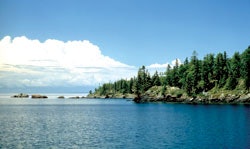Statewide motor vehicle registration fees help keep park programs rolling.
 Photo of Isle Royale National Park in Michigan
Photo of Isle Royale National Park in MichiganWhen Michigan motorists renew their vehicle licenses, they now will be asked if they'd like to pay an additional $10 for a "recreation passport" as part of a new fundraising effort for state parks. Good for one year, the passport will grant access to all of Michigan's 98 state parks and recreation areas, plus boat launches. "I hope the public stands up and says, 'Our parks are important, and we're going to support them through this program,'" Erin McDonough, executive director of Michigan United Conservation Clubs, told the Associated Press.
Meanwhile, voters in California head to the polls this month to vote on Proposition 21, which would add $18 to the fee state motorists pay to license more than 28 million cars, motorcycles and recreational vehicles - raising $500 million a year in the process to help operate, maintain and repair California's 278 parks, which have been hurt by severe budget cuts. In return, residents would receive free admission to state park sites, a perk that doesn't sit well with some opponents. "It is the Legislature's responsibility to fully fund the programs it creates, such as state parks, and to stop new spending when revenue falls short," Michelle Steel, a member of the State Board of Equalization and the "No on 21" campaign, told The San Francisco Chronicle. "Additional and necessary funding for parks shouldn't be forced out of the pockets of Californians who lack the ability to visit the parks."
The San Bernardino County Sun, in a recent editorial, called Prop 21 "a cynical manipulation of the automotive fees system for something entirely unrelated to car registrations. We could, after all, tack on more fees on the [Department of Motor Vehicles] forms for more fully funded libraries, schools and universities as well - but what does that have to do with our cars?"
While Californians debate the methods to rescue their state parks, Michigan's recreation passport seems to have encountered little resistance - mostly likely because motorists are given an option. Approved by the Michigan Legislature last year, the system is based on one in Montana in which motorists automatically pay a parks fee unless they opt out. Under the Michigan plan, people won't be charged unless they check the "yes" box on their renewal form. Officials at the state's Department of Natural Resources and Environment expect up to 50 percent participation in the recreation passport program. If that's the case, the effort could generate more than $35 million - almost three times as much as the state park system receives now from vehicle and boating access fees in a typical year.
Founded nearly a century ago, the Michigan state park system is among the nation's oldest. But it's been in the poorhouse for years, a situation made worse in 2004 when the system was cut from the state's general-fund budget. Since then, parks have relied mainly on entrance and camping fees, which won't cover a backlog of repairs and improvements that now total approximately $340 million, parks officials say. As an example, the campground toilet and shower buildings at Proud Lake Recreation Area in Oakland County are so unsightly that some visitors won't use them, according to interim supervisor Andrew Haapala. "We clean them several times a day, but some of the families don't want to take their kids in there for a shower," Haapala told AP environmental reporter John Flesher. "They think it's dirty, because it just looks old. The toilets and showers are so outdated, we have to scavenge parts from the other parks when they wear out."




































